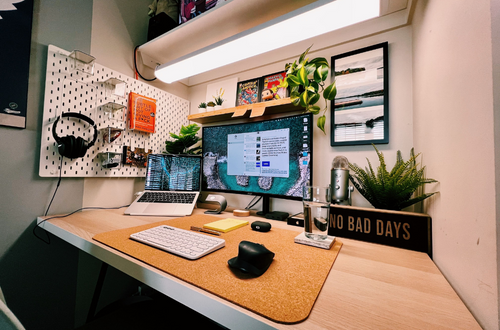How to Overcome Productivity Guilt
6 minute read.
Why Do I Feel Guilty for Doing Nothing?
What a hard, sad question to answer.
First off, you’re always doing something. Whether you are producing, creating, resting, decompressing, staring off into space as your mind reviews the day thus far - we are always in the state of doing. Completing.
Our culture assigns value to those who work hard, or are “productive.” This value is not based on their actual values, morals or ethics. This is not our fault, it’s impossible to resist this state of mind living under capitalism (more on that later). But it is up to us to unlearn this harmful, oppressive belief.
We are all either activity pursuing productivity or healing from our culture’s need to overproduce.
What is Productivity Guilt?
The phrase “productivity guilt” is self-explanatory. We experience guilt around the amount of tasks we accomplish, whether it be work related or in self-development.
Because perfectionism is so embedded in work culture in the US, no matter how productive we are, we will always feel a little guilty for not having completed enough.
Productivity Guilt + Capitalism.
Under capitalism, our current economic and political structure, we are groomed to be producers and consumers. Meaning that when we are not buying, indulging or binge watching, we are being productive. Sometimes, we are doing both with multiple screens in our vision.
Capitalism does not allow room for human need. This means that we learn to deprioritize recovering from illness, emotional wellness, relationships and high quality of life. When we are not productive, we are made to feel badly about ourselves, both directly by way of exploitative bosses and indirectly by way of pizza parties rewarding us for hard work while our health benefits are gutted.
Productivity + COVID-19 Pandemic.
Over two years into the COVID-19 pandemic, we have learned that many jobs that formerly refused to allow remote work, could actually do so with ease. This culture has made many jobs inaccessible for the disabled, chronically ill, and individuals who don’t drive and have no access to public transit.
There are many reasons for this, including the desire to not spend more money for remote work equipment, and to get the highest dollar amount out of their rental agreements, continuing the relationships they hold with the landlords who rent them their workspaces.
This means that companies choose to not make jobs more accessible because it interrupts their wealth hoarding.
Magically, these professional workplaces were able to make the shift to remote work within days of the start of the lock down in the US. During this time, productivity increased.
Despite this, managers continue to police productivity by way of spy software and chat apps that monitor your clicks. This furthers the incorrect message that workers are inherently lazy and will commit the ultimate offense of time-theft if left without constant supervision.
No wonder we experience guilt, even fear, that we are not productive enough.
How to Overcome Productivity Guilt.
Overcoming productivity guilt is hard, but doable! If you live in Pennsylvania and are looking for a therapist that works through an abolition, intersectional, anti-hustle lens, scheduled a free consultation here.
If you are a therapist, social worker, or psychologist looking to free yourself from exploitative bosses, supervisors and managers, schedule a call here. I offer coaching services to clinicians who wish to build a private practice that aligns with their values, and wish to no longer have their labor exploited.
1. Listen to your body.
What is it saying? Aches, pains, exhaustion, illness and abrupt shifts in mood all contain messages that your body is trying to communicate.
Anxious stomach? Can’t keep your eyes open? Hand cramps? Low back pain?
If your body is sending you a clear message but you have not completed the amount of tasks you planned for the day, try taking a break. You can stretch, take a bio break, take a walk, or even decide that you are finished for the day.
This feeds your brain the message that your to-do list does not make the rules, but that your mind and body do. The result of this new association will be beneficial in overcoming productivity guilt.
2. Ask for accommodations if you need them.
The 8 hour work day with overtime is a compromise. It was not decided because researchers told us that humans can safely work an 8 hour day. It was established in 1938 after lobbying, protesting, union mobilization, and the pain and suffering of many, many workers.
If the demand of an 8 hour work day is challenging for you (like it is for many, including myself) you may have the option of asking for accommodations. If you feel it is safe to do so, talk to your supervisor or HR representative about your options.
Individuals with ADHD, anxiety, depression, Autism Spectrum Disorder, and many other mental health diagnoses and learning disabilities have the right to accommodations. As do individuals with physical disabilities, chronic illness and chronic pain.
This process can be challenging as you will likely need signed documentation from your therapist or physician. You may experience some guilt of even misplaced envy from coworkers, but having a safe, happy work day is worth some discomfort in the long run.
With that, please familiarize yourself with your rights at your job. That includes accommodation, privacy and benefits.
3. Keep track of what you accomplish.
My favorite part of making a to-do list is writing down things that I’ve already accomplished. Morning routine? Check. Sit down at my desk by 10am? Check. Return a personal phone call (if I have the energy for it)? Check.
This is a good way to remind yourself that by simply existing and moving through your daily rituals, you are completing tasks that decrease the amount of stress you’ll have later.
4. Set realistic expectations for yourself.
Set goals that are achievable, not goals that would prove you are productive. Let me explain, sometimes we push ourselves beyond our limits because too much is being asked of us, we are comparing ourselves to others or we simply want to finish a task.
If we take another look at the nature of capitalism, production of goods is based on profit, not the needs of the public. On a micro level, we do the same thing to ourselves. We accomplish more than we need to in a day so we can feel that dopamine rush of pleasure and fulfillment.
This may also happen because we get positive attention from those that exploit our labor (management, consumers, etc.). And because of internalized capitalism, we also do it because we judge ourselves.
If you are to set goals for the day based on what actually needs to be completed, what would look different?
5. Value your time.
Decide when things must be completed. If it is Monday and you have a task on your long to-do list that is due Friday but takes less than a day’s work, you do not need to prioritize it now, or shame yourself for not completing it today.
We have plenty to be stressed about, millennials especially. Because we are groomed to be both consumers and producers, learning to value your time is a personal journey that we must undertake.
6. Practice self-compassion when you start comparing.
Everyone is different. Everyone is vastly different.
We come from different socioeconomic backgrounds and we hold different ethnic and racial identities. We have bodies of different shapes and sizes with different abilities and different genetics. We are born with assigned sexes that may differ from our identified gender and we all love differently. We experience different traumas and have different experiences that shape how we view the world and ourselves. We hold different privileges that prevent us from understanding the experience of others. We are different.
Remind yourself of the long list of differences that you share with another person before you begin comparing your own productivity to theirs.
7. Find other ways to nurture your value.
As I’ve talked about before, internalized capitalism occurs when we feel our self-worth is directly linked to our productivity. Because we live in a culture that grooms us to both consume and produce, tending to our own personal growth outside of monetary gain, or even rest, can be viewed as time wasting and lazy.
Thankfully, before capitalism existed, we had ways of establishing and growing our value outside of our productivity. This can come in many forms including our connections with others, our personal beliefs and values, spirituality, hobbies and activities that bring you joy, and how you grow with loss and change.
Recovery.
My hope for you is that you can find value outside of your productivity and experience less guilt when you prioritize rest.
Ready to start therapy? Pennsylvanians, schedule a free call here. Therapists who want to build their dream private practices, let’s talk!
Thank you for reading!
Email contact@teletherapywithsarah.com with questions/comments/love.
Anxiety therapy, depression therapy, trauma therapy for professional millennials. Business coaching for therapists who have been exploited by managers, bosses and supervisors. I help therapists build their dream private practices.
Online therapy in Philadelphia, Pittsburgh, Erie, and Lancaster. Teletherapy to all Pennsylvanians.
International business coaching.
Ready to get started? Schedule a free 20 minute consultation here.
I do not work through insurance, but I provide superbills for EMDR therapy sessions and regular therapy sessions. Learn about getting reimbursement from your insurance provider here.
Very Best,
—Sarah (she/her)
*Disclaimer - This piece was written by a cis/het, non-disabled, white woman. Intersectionality (coined by lawyer, civil rights advocate, scholar and philosopher Kimberlé Crenshaw) tells us that race, ethnicity, class, sexuality, gender, etc. that differ from the above identifiers encounter hardship and oppression at a much higher rate.*
Find a therapist:
includsivetherapists.com
therapyden.com
zencare.co
thrivingcampus.com
openpathcollective.org
Call 211 for Help
Resources for food, mental health, immigration.
Dial 211.
https://www.211.org/
National Suicide Prevention Lifeline
Hours: Available 24 hours. Languages: English, Spanish. Learn more
1-800-273-8255
Dial 988 - Starting July 16, 2022
National Domestic Violence Hotline
1-800-799-SAFE (7233)
Text “START“ to 88788
https://www.thehotline.org/






